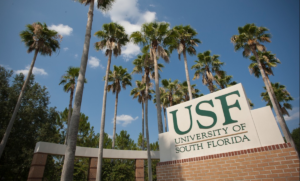USF aims to get ‘at-risk’ students back on track

Homelessness, food insecurity and impoverishment are some of the issues former Director of Student Affairs Tom Miller and Student Government (SG) have chosen to collaborate on combating this academic year.
Since 2006, Miller has dedicated research to the success of “at-risk” students at USF. Miller said this refers to students facing “psychosocial barriers” such as homelessness, poverty, struggles with addictions and living in foster care.
However, after Student Body President Britney Deas and Student Body Vice President Travis McCloskey introduced their platform last March for the 2019-20 academic year, their like-minded initiatives were able to align.
Deas and McCloskey’s Bull S.H.I.F.T. platform is based on the following pillars: Success, Health, Innovation, Finance and Tradition.
According to the 60th term initiatives, the administration will be collaborating with Housing and Residential Education to help students with unstable home lives find last-minute residence hall rooms when necessary.
They also took into consideration impoverished students at USF. One way in which they want to help less fortunate students is to “create merit-based Student Government scholarships.”
Miller applauded SG’s commitment to working with Homeless Helping Homeless, which is a nonprofit emergency shelter in Tampa.
“Looking at these four groups of students (homeless, students in poverty, foster kids and students struggling with addictions), SG is all over this,” Miller said. “They’re actively working with students that are food-insecure by expanding the on-campus food pantry.”
In order to reach students struggling with food shortages, Deas and McCloskey said in their platform that they intend to “create a meal voucher program for leftover swipes to be donated to food insecure students,” according to the SG website.
McCloskey could not be reached by the time of publication.
As chair of the Student Persistence Committee, Miller has researched how to counteract “psychosocial barriers” to success.
Although most of the statistics on the incoming class of 2023 are what Miller deems “murky,” he knows that about 220 students are designated as “below the poverty line.”
It is estimated that “58,000 students are homeless on campuses worldwide,” according to a 2017 study from Eastern Michigan University.
Almost all of the data used to determine whether a student meets these psychosocial barriers is obtained from admissions and FAFSA records, according to Miller.
One outreach initiative USF offers to combat these barriers is the “Don’t Stop, Don’t Drop” initiative, which is a fund of “roughly $35,000-40,000” that began in 2009 and looks to support students who cannot finish college due to financial troubles.
By identifying these students using analytics gathered by Miller’s team, advisors can nominate students to receive financial assistance like reducing tuition and grants to help finish their degree.
Alongside the committee, Miller has been focusing specifically on student retention and engagement. He’s identifying students in need and providing them with access to campus resources, such as Bull2Bull, outreach programs and having their Resident Assistant (RA) engage with them.
“Some of these students do very well, however many don’t do so well because of [external barriers],” Miller said. “It’s intuitive in my job to focus on the students that meet these characteristics and make sure they have the backup they need.”
Miller’s focus on the success and engagement of “at-risk” students coupled with SG’s current focus on battling student issues are hoping to strengthen the on-campus resources centered on the growing homeless and financially insecure community at USF.
“There is a lot of overlap with what we’re doing and what Britney and Travis are aiming to do with our team,” Miller said.







